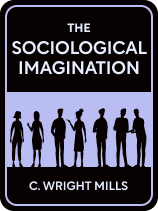

This article is an excerpt from the Shortform book guide to "The Sociological Imagination" by C. Wright Mills. Shortform has the world's best summaries and analyses of books you should be reading.
Like this article? Sign up for a free trial here .
What is the purpose of social science? What should it be?
In The Sociological Imagination, professor and sociologist C. Wright Mills argues that the main purpose of social science must be the preservation of freedom. In his definition of freedom, Mills directly connects it to our choices. He also discusses the contemporary trends he says threaten the possibility of a free society.
Keep reading to learn Mills’s perspective on the purpose of social science.
The Purpose of Social Science
What is the purpose of social science? Mills believes that it’s the preservation of freedom, which he defines as the ability to understand, debate over, and decide between choices—particularly in a social and political context. Freedom, explains Mills, is the main mechanism for making social and political decisions. All three components of his definition contribute to decision making:
- Freedom allows people to understand problems and the choices they have to address them.
- Freedom allows people to debate over choices of how to respond to problems.
- Freedom allows people to decide on a specific response.
(Shortform note: While many other social scientists try to use their work to benefit a free and open society, they often differ in how they try to achieve this purpose. Often, social scientists suggest that their work should inform the policymaking of governments or other major social institutions. However, Mills rejects this approach and instead argues that social science should directly inform members of society—who then can decide for themselves how to improve their society. He believes influencing policymakers isn’t enough to preserve a free society, because their institutions have become fundamentally anti-freedom (an argument he explains in his earlier work, The Power Elite).)
The Main Threat to Freedom
In contemporary Western society, Mills argues, the main threat to freedom is complexity. In other words, societies and their institutions have become so complex that people don’t understand what they are, how they work, or why they matter. For example: Not only does nobody know all the federal laws in the United States, nobody knows how many federal laws there are in the United States.
This complexity threatens freedom because it prevents members of society from understanding what’s happening in their society and how it affects them. Lack of understanding leads people to political apathy or the feeling that they can’t effect social change—under these circumstances, nobody will prevent small groups of elites from taking political power at the expense of the rest of society.
(Shortform note: To Mills, the link between powerful elites and political apathy is intentional and informs many of his concerns in The Sociological Imagination. In The Power Elite, Mills suggests that there is a growing centralization of political and economic power in the United States. He claims that this deprives the average American of a political voice—as the group of elites making major decisions becomes smaller and smaller, it becomes harder for regular people to politically mobilize or even understand their country’s politics. Therefore, to Mills, a country run by a few powerful elites isn’t a consequence of political apathy—it’s the cause of political apathy.)

———End of Preview———
Like what you just read? Read the rest of the world's best book summary and analysis of C. Wright Mills's "The Sociological Imagination" at Shortform .
Here's what you'll find in our full The Sociological Imagination summary :
- C. Wright Mills's theory of how social science can preserve freedom
- What grand theory is and how it's flawed
- How social science based entirely on empirical evidence harms freedom






